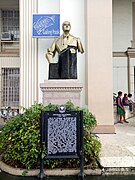
Diosdado Macapagal
Diosdado Pangan Macapagal GCrM, KGCR (Tagalog: [djosˈdado makapaˈɡal];[1] September 28, 1910 – April 21, 1997), often referred to by his initials DPM, was a Filipino lawyer, poet and politician who served as the ninth President of the Philippines, serving from 1961 to 1965, and the sixth Vice President, serving from 1957 to 1961. He also served as a member of the House of Representatives, and headed the Constitutional Convention of 1970. He was the father of Gloria Macapagal Arroyo, who followed his path as President of the Philippines from 2001 to 2010.
This article is about the former president of the Philippines. For his grandson and former member of Congress, see Diosdado Macapagal Arroyo.
Known as "the poor boy from Lubao," he was a native of Lubao, Pampanga. Macapagal graduated from the University of the Philippines and University of Santo Tomas, both in Manila, after which he worked as a lawyer for the government. He first won the election in 1949 to the House of Representatives, representing the 1st district in his home province of Pampanga. In 1957, he became vice president under the rule of President Carlos P. Garcia, whom he later defeated in the 1961 election.
As president, Macapagal worked to suppress graft and corruption and to stimulate the growth of the Philippine economy. He introduced the country's first land reform law, placed the peso on the free currency exchange market, and liberalized foreign exchange and import controls. Many of his reforms, however, were crippled by a Congress dominated by the rival Nacionalista Party. He is also known for shifting the country's observance of Independence Day from July 4 to June 12, commemorating the day President Emilio Aguinaldo unilaterally declared the independence of the First Philippine Republic from the Spanish Empire in 1898. He stood for re-election in 1965, and was defeated by Ferdinand Marcos.
Under Marcos, Macapagal was elected president of the 1970 constitutional convention that would later draft what became the 1973 Constitution, though the manner in which the charter was ratified and modified led him to later question its legitimacy. He died of heart failure, pneumonia, and renal complications, in 1997, at the age of 86.
Macapagal was also a poet in the Spanish language, though his poetic oeuvre was eclipsed by his political biography.
Vice presidency (1957–1961)[edit]
In the May 1957 general elections, the Liberal Party drafted Congressman Macapagal to run for vice president as the running-mate of José Y. Yulo, a former speaker of the House of Representatives. Macapagal's nomination was particularly boosted by Liberal Party president Eugenio Pérez, who insisted that the party's vice presidential nominee have a clean record of integrity and honesty.[2] While Yulo was defeated by Carlos P. Garcia of the Nacionalista Party, Macapagal was elected vice president in an upset victory, defeating the Nacionalista candidate, José B. Laurel, Jr., by over eight percentage points. A month after the election, he was chosen as the president of the Liberal Party.[8]
As the first ever Philippine vice president to be elected from a rival party of the president, Macapagal served out his four-year vice presidential term as a leader of the opposition. The ruling party refused to give him a Cabinet position in the Garcia administration, which was a break from tradition.[7] He was offered a position in the Cabinet only on the condition that he switch allegiance to the ruling Nationalista Party, but he declined the offer and instead played the role of critic to the administration's policies and performance.[6] This allowed him to capitalize on the increasing unpopularity of the Garcia administration. Assigned to performing only ceremonial duties as vice president, he spent his time making frequent trips to the countryside to acquaint himself with voters and to promote the image of the Liberal Party.[6]
As president, Macapagal worked to suppress graft and corruption and to stimulate the Philippine economy.
Personal life[edit]
First marriage[edit]
In 1938, Macapagal married Purita de la Rosa. They had two children, Cielo Macapagal-Salgado (who would later become vice governor of Pampanga) and Arturo Macapagal. Purita died in 1943.
Second marriage[edit]
On May 5, 1946, Macapagal married Dr. Evangelina Macaraeg, with whom he had two children, Gloria Macapagal Arroyo (who would later become president of the Philippines) and Diosdado Macapagal, Jr.
Named after Diosdado Macapagal:



